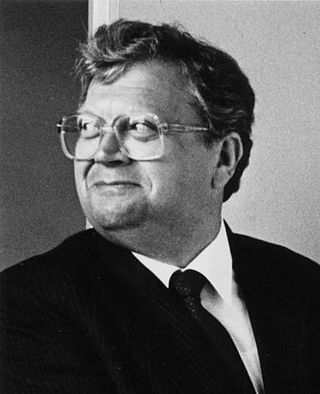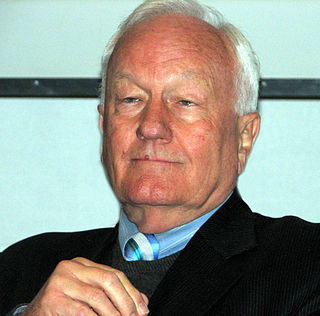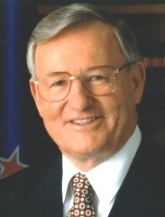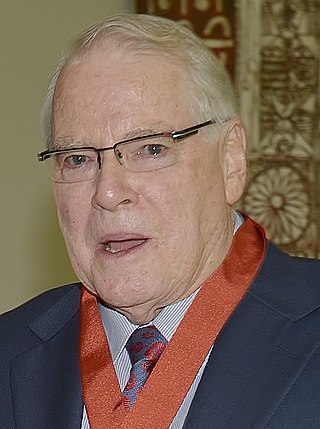Related Research Articles

Michael Kenneth Moore was a New Zealand politician, union organiser, and author. In the Fourth Labour Government he served in several portfolios including minister of foreign affairs, and was the 34th prime minister of New Zealand for 59 days before the 1990 general election elected a new parliament. Following Labour's defeat in that election, Moore served as Leader of the Opposition until the 1993 election, after which Helen Clark successfully challenged him for the Labour Party leadership.
Rogernomics were the neoliberal economic reforms promoted by Roger Douglas, the Minister of Finance between 1984 and 1988 in the Fourth Labour Government of New Zealand. Rogernomics featured market-led restructuring and deregulation and the control of inflation through tight monetary policy, accompanied by a floating exchange-rate and reductions in the fiscal deficit. His adoption of policies more usually associated with the political right, and their implementation by the Fourth Labour Government, became the subject of lasting controversy.

David Russell Lange was a New Zealand politician who served as the 32nd prime minister of New Zealand from 1984 to 1989.

Sir Roger Owen Douglas is a retired New Zealand politician who served as a minister in two Labour governments. He became best known for his prominent role in New Zealand's radical economic restructuring in the 1980s, when the Fourth Labour Government's economic policy became known as "Rogernomics".

James Patrick Anderton was a New Zealand politician who led a succession of left-wing parties after leaving the Labour Party in 1989.

Richard William Prebble is a former member of the New Zealand Parliament. Initially a member of the Labour Party, he joined the newly formed ACT New Zealand party under Roger Douglas in 1996, becoming its leader from 1996 to 2004.

The 1990 New Zealand general election was held on 27 October to determine the composition of the 43rd New Zealand parliament. The governing Labour Party was defeated, ending its two terms in office. The National Party, led by Jim Bolger, won a landslide victory and formed the new government.

The 1993 New Zealand general election was held on 6 November 1993 to determine the composition of the 44th New Zealand Parliament. Voters elected 99 members to the House of Representatives, up from 97 members at the 1990 election. The election was held concurrently with an electoral reform referendum to replace the first-past-the-post system, with all members elected from single-member electorates, with mixed-member proportional representation. It saw the governing National Party, led by Jim Bolger, win a second term in office, despite a major swing away from National in both seats and votes, and the carrying of the referendum by 53.9% to 46.1%.

David Francis Caygill is a former New Zealand politician. Caygill was born and raised in Christchurch. He entered politics in 1971 as Christchurch's youngest city councillor at the age of 22. He served as a Member of Parliament (MP) from 1978 to 1996, representing the Labour Party. A supporter of Rogernomics, he served as Minister of Finance between 1988 and 1990. From 2010 to 2019, he was one of the government-appointed commissioners at Environment Canterbury.

Richard John Northey is a New Zealand politician. He was an MP from 1984 to 1990, and again from 1993 to 1996. He served on the Auckland Council between 2010 and 2013, and is a member of the Labour Party.

Michael Edward Rainton Bassett is a former Labour Party member of the New Zealand House of Representatives and cabinet minister in the reformist fourth Labour government. He is also a noted New Zealand historian, and has published a number of books on New Zealand politics, including biographies of Prime Ministers Peter Fraser, Gordon Coates and Joseph Ward.
The Fourth Labour Government of New Zealand governed New Zealand from 26 July 1984 to 2 November 1990. It was the first Labour government to win a second consecutive term since the First Labour Government of 1935 to 1949. The policy agenda of the Fourth Labour Government differed significantly from that of previous Labour governments: it enacted major social reforms and economic reforms.
Frederick Miroslav Gerbic was a New Zealand politician of the Labour Party.
Malcolm Douglas is a former New Zealand politician of the Labour Party. He lives in Karaka south of Auckland.
The 1980 New Zealand Labour Party leadership election was held on 12 December 1980 to determine the leadership of the New Zealand Labour Party. The leadership was retained by former Prime Minister Bill Rowling, who had led the party for the last six years.
On 3 February 1983, a New Zealand Labour Party leadership election was held to determine the leadership of the New Zealand Labour Party. The leadership was won by Mangere MP David Lange, who had been Deputy Leader of the party since 1979.
The 1988 New Zealand Labour Party leadership election was held on 21 December 1988. The incumbent leader of the New Zealand Labour Party David Lange was re-elected with 72% of the vote. To date it is the only instance when a sitting Prime Minister has been challenged for leadership in a caucus vote.
The 1990 New Zealand Labour Party leadership election was held on 4 September to determine the leadership of the New Zealand Labour Party. The leadership was won by Christchurch North MP Mike Moore.

The 1989 New Zealand Labour Party leadership election was held to determine the leadership of the New Zealand Labour Party. The leadership was won by Christchurch Central MP and incumbent deputy leader Geoffrey Palmer.

The Fish and Chip Brigade was a humorous name given to four leading members of the New Zealand Labour Party who became senior members in the Fourth Labour Government (1984–1990). The politicians in the 'brigade' were future Prime Ministers David Lange and Mike Moore, future Minister of Finance Roger Douglas, and future Minister of Health and Local Government Dr. Michael Bassett. Future Minister for State Owned Enterprises Richard Prebble was also present but is not seen in the photo itself.
References
- Bassett, Michael (2008). Working with David: Inside the Lange Cabinet. Auckland: Hodder Moa. ISBN 978-1-86971-094-1.
- Lange, David (2005). My Life. Viking. ISBN 0-670-04556-X.